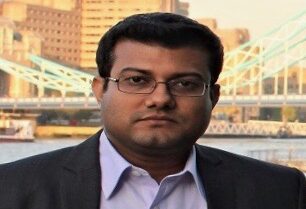John Hoffmire: I remember when I met you at Oxford in 2015, feeling like you and I had similar interests and unusual career tracks that bounced us back and forth between working to alleviate poverty, management consulting, and public policy. Am I right about the unusual career paths?
Param: I’ve always been interested in both development finance and market opportunities that develop sustainable solutions to social and economic difficulties faced by low-income communities at the bottom of the pyramid. Like you, I’m interested in the intersection of business, economics, and poverty alleviation, as well as the ways in which governments, institutions and universities can put theories into practice to influence villages and the lives of real people for the better. I also strive to promote evidence-based policy-making because it results in more impactful socio-economic development, particularly for disadvantaged and vulnerable communities.
John: Tell me about the work you’ve been doing since you were a CRISP Scholar at Oxford.
Param: When we met, I was working for a leading development advisory company in India which provided advisory and project implementation services to government and industry on sustainable infrastructure, investment facilitation, livelihood creation, monitoring, and evaluation. About a year later, I joined Villgro Innovations Foundation, a large, pioneering, Indian social enterprise incubator. There I was involved in facilitating market-based models to alleviate poverty and create impactful, innovative, and successful incubators and enterprises in Agriculture, Health, Education and Livelihoods. That was followed by a four-year stint at Deloitte Consulting where I was engaged in providing consultancy to governments and development agencies on agriculture and rural transformation projects. Presently, I’m a Monitoring and Evaluation Specialist at the Development Monitoring and Evaluation Office (DMEO) of NITI Aayog (abbreviation for National Institution for Transforming India), the premier policy think tank of the Government of India. Explaining my work as I have just done, in a nutshell, makes me see that you are right – like you, I’ve moved in and out of business and consulting, to social innovation, poverty alleviation and public policy. To me, they are all linked. Social innovation and poverty alleviation can be achieved through market-based models with the engagement of businesses and financing and through inclusive economic policy and growth.
You see, while India’s economy has grown significantly this past decade or so, the growth has been uneven and there is still widespread poverty. There is an increased realization that the challenges faced by the poor demand engagement from all sectors, and a growing understanding that inclusive growth is critical to create an equitable society and to prevent the build-up of social pressures.
John: I completely agree with you about business and poverty alleviation being linked and about the importance of inclusive economic growth. Tell me more about DMEO, NITI Aayog and your work there.
Param: As I mentioned, NITI Aayog is the policy think tank of the Government of India. It was established in 2015 to replace the Planning Commission and provide directional and policy inputs for designing strategic and long-term policies and programmes for the Government of India along with relevant technical advice to the Centre, States, and Union Territories of India. DMEO is an attached office of NITI Aayog which has been mandated to actively monitor and evaluate the implementation of schemes, programmes and initiatives of the Government of India (GoI) to strengthen their implementation and scope of delivery on an ongoing basis.
My work there focuses on evaluating impacts of government schemes and programmes. It also includes identification of gaps and challenges in implementation. Furthermore, I provide recommendations to improve delivery and impacts.
We are trying to help the GoI measure outcomes and impacts as well as physical and financial progress. We also identify replicable success stories for wider dissemination. The overall objective is to make evidence-based policy-making integral to the overall governance structure in India.
John: You were a fellow of the Chevening Research Science and Innovation Leadership Programme (CRISP) in 2015. Tell me more about your experience with the program and how it has helped shape where you are today.
Param: Attending CRISP was a fantastic experience and it helped me in more ways than I had imagined. It consisted of outstanding lectures, course work, field trips, and an individual research project which each of the attending scholars had to work on. The stimulating lecture sessions covered various relevant topics related to entrepreneurship, social responsibility, leadership, branding, sustainability, public policy, and other topics – all of which were extremely thought-provoking and helped me develop new perspectives. Many of these lectures helped me in my professional work later on.
Apart from the lectures, other elements of the programme such as mentoring, visits to different institutes and facilities, group projects, and the individual research project made it a holistic development experience.
The programme was also very enriching in terms of learning from and developing lasting friendships with other CRISP fellows and Oxford faculty members especially Richard Briant and yourself.
To summarize, it was a once in a lifetime experience.
John: After listening to you, I still feel like we have similar interests and ways of looking at and addressing poverty. It’s been a delight catching up with you and hearing about what you’ve recently been up to. I wish you continued success. Thank you.
Param: Thank you, John. The pleasure‘s been mine. Stay well.
Paramjyoti Chattopadhyay is a Monitoring and Evaluation Specialist at DMEO, NITI Aayog, and an alum of the Chevening Research Science and Innovation Leadership Programme (CRISP) 2015.
Interviewer: Dr. John Hoffmire is the Carmen Porco Chair at the Center on Business and Poverty, and Research Associate at the Oxford Centre for Mutual and Co-owned Business





